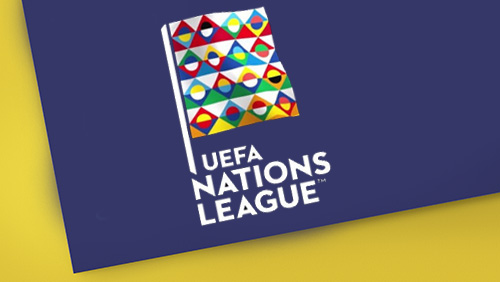This weekend, international teams compete in the UEFA Nations League, but what is it, and who are the front-runners, according to the bookies?
 Watching a football match was the most ceremonial I ever was. Live games were not for me. Shitty views, broken backs, and daylight robbery when it came to ticket prices.
Watching a football match was the most ceremonial I ever was. Live games were not for me. Shitty views, broken backs, and daylight robbery when it came to ticket prices.
An armchair fan.
Crank up the volume, tell the wife to do one, lock the kid in his bedroom, allowing him anything just for one night, sit on the edge of the settee, and drink can after can after can.
If a goal went in, then act like a complete Nobhead, screaming, throwing cans, kicking cats, that sort of stuff.
Only two teams turned me into an idiot.
Man Utd.
And.
England.
And it could be any game.
League.
Cup.
Friendly.
Scratch that.
I could never abide friendlies.
I hated the friendlies.
It’s more enjoyable listening to carol singers. And you can’t even have a bet.
You would be knee deep in it, hoping for a second-half miracle, only for the manager to change the entire team.
Not any longer.
The UEFA Nations League Kills Friendlies
There’s a new international competition beginning in the next 72 hours. It’s called the UEFA Nations League. It’s brand spanking new. The first new thing UEFA has created since 1960.
I like the idea; although I am not sure why the creators have made the concept as complicated as trying to watch a movie from the front row of the cinema.
Theoretically, with the advent of the new competition, there will be far fewer friendlies, and that’s a great thing. Also, UEFA based the seedings for the leagues on the UEFA National Team Coefficient Rankings, meaning no more useless clashes like England v San Marino.
UEFA have grouped teams of equal status.
And I love the promotion and relegation aspect.
The thought of seeing a minnow nation rising to the top is what defines the sport, and we have never before had this experience in international football.
Here’s how it all works.
How It All Works
55 European teams compete, split into four primary leagues (A-D), and four smaller groups (1-4).
UEFA held the draw in January. Here are the groups and betting odds.
League A Groups and Odd
Group 1
1. Germany (6/5)
2. France (10/11)
3. Netherlands (8/1)
Group 2
1. Belgium (2/5)
2. Switzerland (11/4)
3. Iceland (8/1)
Group 3
1. Portugal (6/4)
2. Italy (11/10)
3. Poland (7/2)
Group 4
1. Spain (4/5)
2. England (5/2)
3. Croatia (3/1)
League B
Group 1
1. Slovakia (7/4)
2. Ukraine (13/8)
3. Czech Republic (15/8)
Group 2
1. Russia (13/8)
2. Sweden (13/8)
3. Turkey (19/10)
Group 3
1. Austria (11/8)
2. Bosnia & Herzigova (6/5)
3. Northern Ireland (7/2)
Group 4
1. Wales
2. Republic of Ireland
3. Denmark
League C
Group 1
1. Scotland (13/8)
2. Albania (5/2)
3. Israel (13/5)
Group 2
1. Hungary (2/1)
2. Greece (11/8)
3. Finland (5/1)
4. Estonia (10/1)
Group 3
1. Slovenia (21/10)
2. Norway (2/1)
3. Bulgaria (3/1)
4. Cyprus (8/1)
Group 4
1. Romania (5/2)
2. Serbia (Evens)
3. Montenegro (4/1)
4. Lithuania (25/1)
League D
Group 1
1. Georgia (4/5)
2. Latvia (4/1)
3. Kazakhstan (3/1)
4. Andorra (50/1)
Group 2
1. Belarus (4/6)
2. Luxembourg (23/4)
3. Moldova (4/1)
4. San Marino (150/1)
Group 3
1. Azerbaijan (6/4)
2. Faroe Islands (7/1)
3. Malta (20/1)
4. Kosovo (6/4)
Group 4
1. Macedonia (8/11)
2. Armenia (23/17)
3. Liechtenstein (40/1)
4. Gibraltar (150/1)
There is only one winner, and that team will come from the League A groups. The four League A, group winners, compete in a knockout phase featuring a semi-final, third-place play-off and final.
The competition takes place biennially.
The league phase runs between September and November.
The draw for the semi-finals takes place in December, with the finals taking place in June 2019. One of the quartet will act as host of the final.
Promotion and Relegation
Except for League A teams, the four group winners of all the other leagues will gain promotion, and the four teams that finish at the bottom of the groups experience relegation. The only caveat concerns League C where the three fourth-placed sides suffer relegation and the lowest ranking third place team. League D teams don’t fear the spectre of relegation because they are already in the basement.
UEFA Euro 2020 Qualification
UEFA has also been smart enough to add a coat of glamour to the tournament by integrating qualification to the UEFA European Championships.
The one-of-a-kind Euro 2020 takes place across 12 cities, in 12 European countries from 12 June to 12 July 2020. As usual, the event will encompass 24 teams and 20 of those qualify via the bog standard route.
In the past, the final four teams emerge from a UEFA European Championship Play-Off, but in 2020 those four places are reserved for the four winners of each respective UEFA Nations League, giving teams two chances of qualifying for the finals. Should a UEFA Nations League winner have already qualified (and plenty will), then the next best finisher in each league takes the spot.
Bye-bye useless friendlies.
Hello UEFA Nations League.
I’m a fan.
It’s time to go out and buy a cat because I am going to need something to kick.
Here are the early odds.
Outright Winner Odds
1. Spain 4/1
2. Belgium 5/1
3. France 4/1
4. Germany 5/1
5. Italy 9/1